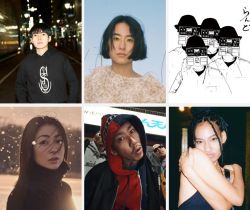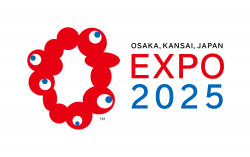

Motorhead's Lemmy. Photo by C.B. Liddell
A growled “Konnichi wa. We’re Motorhead. We play rock ‘n’ roll,” prefaces a blistering version of “Overkill” (or possibly some other song that follows exactly the same well-worn musical groove). Motorhead are less about unique individual songs with discernable lyrics and more about unleashing a great, big, dirty, black oil spill of metal on the audience. Nattily dressed in his black cowboy gear, Lemmy seems like some great broken-backed oil tanker spilling wave after wave of toxic metal pollution onto the beach of the audience, who clearly love every minute of it.
“Rock Out” from last-but-one album Motorizer sticks with the winning formula of a claustrophobic wall of grinding guitars and relentless drumming smeared with the veneer of Lemmy’s unintelligible, guttural growl. I suddenly realize that Lemmy is like Mr. Bean. People don’t have to understand a word he’s saying to appreciate him, and this is no doubt a factor in his popularity here and elsewhere around the non-English-speaking world.
As the song ends, the chants of “Motorhead! Motorhead!” ring out round the cavernous hall. All the people who went over to the Ultimate Stage to take in Angra’s performance instead of getting in front of the Big Rock Stage to get a better view are probably kicking themselves.
Japan’s number one English magazine gets a name check with the next song, “Metropolis,” which Lemmy introduces as a song from a long time ago and dedicates to all the old people in the audience. Crunching riff? Check. General air of malice and evil? Check. Growled indecipherable vocal? Check. Searing guitar breaks? Check. Vintage Motorhead, but then Motorhead only do vintage.
With able support form his cohort on lead guitar, beanie-hatted Welsh guitar wizard Phil Campbell, and energetic Swedish drummer Mikkey Dee, Motorhead fill out a set list that includes a drum-solo-sandwiching version of “ Orgasmatron” and the speed rockabilly of “Going to Brazil,” before climaxing in a blistering version of fan favorite “Ace of Spades.” The moshpit responds by vomiting up crowd surfers at a rate that is clearly uncomfortable for the stewards, who get a bit rough.
Although Motorhead are rock legends of almost biblical proportions, they are trumped on the bill by wet-behind-the-ears screamo-emo outfit Avenged Sevenfold. I am so pissed off by this that I decide to go on strike and not write about them. Instead, fast forward to Ozzy.

Ozzy Osbourne and guitarist Gus G. Photo by C.B. Liddell
It could be argued that Ozzy Osbourne too shouldn’t be higher on the billing than Motorhead, but at least it’s not offensive that he is. Like Lemmy, Ozzy is a true metal legend. Despite the occasional ill-advised flirtation with schmaltz-rock–possibly driven by the populist sensibilities and scheming of wife/manager Sharon–and an image that often seems like a cuddly cartoon character, Ozzy nevertheless manages to retain the dark charisma of a genuine metal god.
There is something disturbing and vaguely werewolfish about him–the large, self-tattooed hands of a natural born killer, the moon-reflecting glint in his eye, the Igor-like way he shuffles around the stage, etc. etc. This strange mismatch of characteristics–lovable in a fluffy dog sort of way, but without losing any of his eerie edge–may also explain his vast, exaggerated appeal with metal fans.
“Are you ready to go f**king crazy?” he asks before launching into a rollicking version of “Bark at the Moon.” Flanked by his two sidemen, Greek guitarist Gus G on guitar and Rob Nicholson on bass, both flailing their waist-length hair while their fingers work overtime, Ozzy prowls the stage belting out the vocals.
As soon as the song ends, he goes to the drum kit and grabs a bucket of water, soaking himself as well as some electrical equipment. For a few seconds it looks like there might be a real moment of madness, but a roadie comes on and makes sure there is no danger of the Prince of Darkness being lit up by a sudden electric shock.
“Let me Hear You Scream” and a brooding version of “Mr. Crowley,” introduced by Adam Wakeman’s synth, maintain the Hammer Horror mood so beloved of Ozzy and his fans. The latter song is also graced by particularly powerful soloing from Gus G, taking the song to a higher level. The crowd goes mad, roaring its appreciation. Ozzy responds by orchestrating a kind of football chant. Then the band jumps into the bundled riffs and clattering rhythms of “I Don’t Know.”
“I can’t bloody hear you,” he tells the audience as they roar their approval.
Next we get an old Black Sabbath standard, “ Fairies Wear Boots,” essentially a thrashing, disjointed blues-rock song given a modern heavy metal veneer by Gus G’s searing guitar. Other Sabbath classics are also updated–“War Pigs” and the stomping, growling menace of “Iron Man.” These seem to go down with the audience a lot better than the breezy metal-lite of “A Shot in the Dark” and “I Don’t Want to Change the World.”
After the Van Halen-ish “Crazy Train” and “Mama I’m Coming Home”—a ballad, oddly enough, co-written with fellow grizzled metal legend Lemmy—Ozzy gives the audience what they really want: “Paranoid,” the ultimate Ozzy, Black Sabbath, and heavy metal song, and an ideal way to bring Loud Park 2010 to close. The simple, insistent riff that has chugged its way through four decades and filled cavernous halls like this all around the world seems to sum up the timeless popular appeal of metal: “There! That’s my last cliché. I’m all out.”







